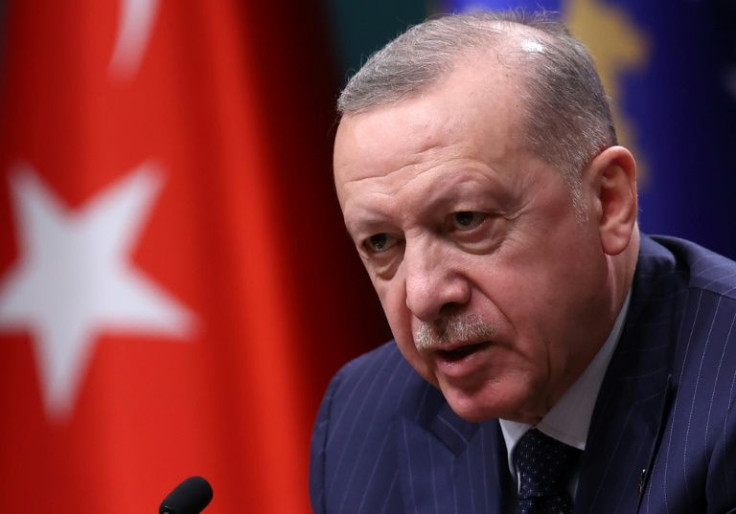By Playing Santa Between Russia And Ukraine, Erdogan Puts Turkey Back Into NATO-Orientation

With the Russian Ukraine invasion, Recep Tayyip Erdogan is eager to shed his bad-boy image in the West, where he is ranked among the authoritarian leaders in the world.
To re-enter the good books of the West, Erdogan knows that Turkey has to dump the special ties with Russia. That is exactly what the 68-year-old leader did though he was sulking to upset Russia initially after the Ukraine invasion Feb. 24.
Erdogan is trying to place Turkey back with traditional allies in NATO and the European Union, by distancing itself from Russia, on which Ankara relies on natural gas, arms, and tourism.
Turkey described the Russian invasion of Ukraine as a "war" after five days, rejected Russia's recognition of Luhansk and Donetsk as republics, and was one of the 80 sponsors of the UN General Assembly resolution titled "Russian Aggression in Ukraine".
In his latest avatar, Erdogan is playing Santa between Russia and Ukraine, raising Turkey's regional status, cementing its ties with the West, and anchoring NATO at the same time.
Turkey is hosting the foreign ministers of two warring countries for talks on the sidelines of the Antalya Diplomatic Forum March 10. The trilateral format talks will see Erdogan's representative present in the room as a mediator in Turkey's resort town of Antalya when Russian Foreign Minister Sergey Lavrov and his Ukrainian counterpart Dmytro Kuleba meet.
Irrespective of the outcome of the talks, Erdogan's interest in hosting the two nations is of significance.
To serve a serious blow to Russian maritime advancement into Ukraine, Turkey invoked clauses of the 1936 Montreux Convention, which bars the passage of warships through the Bosphorous Straits. Turkey shares a maritime border with both nations on the Black Sea and is friendly with both of them.
But under a special clause, warships of the Black Sea littoral countries, including Russia, can return to their base of origin. The move by Erdogan managed to protect the stability of the Black Sea and the Turkish straits.
Though Erdogan tried to sell his new move as part of discharging an international obligation he earned enough kudos from the West as Turkey acts as the gateway between Europe and Asia. Any exception made to please Russia could have jeopardized Erdogan's credibility.
In February, a few days before the Russian invasion, Erdogan visited Kyiv and signed a Free Trade Agreement (FTA), and inked a pact to produce a long-range Bayrakthar drone in Ukraine, which was flayed by Russia and proved handy for the Ukraine army to resist the Russian attack.
With his Bayrakthar drone deal, Erdogan managed to please the West which was angry with Turkey for giving drones to the Azerbaijan army during the Nagorno-Karabakh strife.
In recent years, Turkey's reliability as a NATO member had taken a beating as it drifted away from the West and due to the authoritarianism of Erdogan. Turkey is increasingly viewed by the West as a religiously conservative state as Erdogan has turned the clock back to Islamism.
In the aftermath of the failed coup in 2016, the ruling Justice and Development Party (AKP) alleged the involvement of NATO. By purchasing S-400 missiles from Russia, Erdogan invited U..S sanctioned and was thrown out of the F-35 program.
Erdoğan's government had threatened to expel 10 Western ambassadors, seven from NATO nations for backing philanthropist Osman Kavala, who is facing indefinite detention.
Erdogan put his foreign policy at loggerheads with the West at a time when his approval ratings dropped from almost 56 percent when the pandemic began in 2020 to 38.6 percent at 2021-end.
Besides, the Turkish economy has been passing through the worst state for a long time, marked a growing current accounts deficit and galloping inflation. The fragile Turkish currency lost 5 percent of its value when the Russian invasion began Feb. 24.
Undoubtedly, these considerations weighed heavily in changing Erdoğan's initial inaction against Russia and returning Turkey to its traditional Western strategic orientation.
When Erdogan received March 9 Israeli President Isaac Herzog during a state visit, the western message was loud and clear because Herzog's visit marked the highest level by an Israeli leader to Turkey in 14 years.





